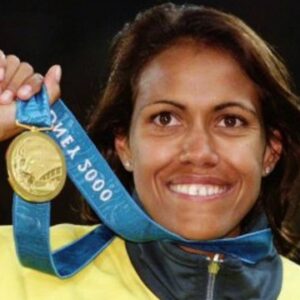Cathy Freeman is an Olympic medalist and former Australian sprinter. She won a silver medal in the 1996 Summer Olympics and a gold medal in the Summer Olympics of 2000. She dealt with challenges such as racial discrimination in her early years. She dreamed of making a name for herself as a female athlete since she was a child. She enlisted the help of Romanian Coach Mike Danila to realize her dream. Her outstanding performance at the Commonwealth Games in Auckland, where she won a gold medal, guaranteed that she became the first female Aboriginal Australian to win a gold medal in an international athletics event. At the Summer Olympics in 2000, she lighted the Olympic Flame. Aside from that, she has received awards such as Australian of the Year, World Sportswoman of the Year, and others. In 2003, she announced her retirement from athletics. She continues to work with her non-profit organization, the Catherine Freeman Foundation, when she retires.
Childhood and Adolescence
Cathy Freeman was born in Mackay, Queensland, Australia, to Norman and Cecilia Freeman. She grew up with her brothers Gavin, Garth, and Norman. Anne Marie, her sister, was her only sibling.
In 1978, her parents split. She earned her first gold medal at the school athletics competition when she was eight years old. She was awarded a scholarship to Fairholme College in Toowoomba in 1988.
Bruce Barber, her stepfather, was her coach until 1989. She afterwards went to Kooralbyn International School, where she received professional training from Romanian Coach Mike Danila.
Career of Cathy Freeman
She moved to Melbourne in 1990 after winning a gold medal in the 4X100 m relay at the Commonwealth Games in Auckland. She became the first female Aboriginal Australian to win a gold medal at an international athletics tournament with this victory.
She met athletics coach Peter Fortune in Melbourne, and he coached her for the rest of her career.
She was chosen to compete for Australia in the 1990 World Junior Athletics Championships in Plovdiv, Bulgaria. She qualified for the semi-finals in the 100 m and finished sixth in the 400 m final.
In 1992, she competed in her second World Junior Championships, which were held in Seoul, South Korea. She competed in the 200 m event and earned a silver medal.
She competed in her first Olympic Games in 1992, reaching the second round of the 400 meter dash.
She competed in the 200 m event at the 1993 World Athletics Championships, reaching the semi-finals.
In her sporting career, the year 1994 was pivotal. For the first time in her life, she has been accepted into the world’s elite. She competed in the Commonwealth Games in Canada in 1994. She won gold medals in the 200 m and 400 m for her great performance in this competition. She was also a member of Australia’s 4x100m relay team, which won silver.
She came in fourth place in the 1995 World Athletics Championships in Sweden. She also qualified for the semi-finals in the 200 meters in that tournament.
She presented France’s Marie-Jose Perec with the greatest challenge during the 1996 Olympics. She took silver after finishing second behind Perec and setting an Australian record of 48.63 seconds.
In 1997, she won the 400 meter dash at the World Championships in Athens. In 49.77 seconds, she completed the 400 meter dash.
She took a sabbatical from racing for the 1998 season due to injuries, but returned in 1999.
She won every 400 m event after her return in 1999, including the World Championships. She competed with her adversary Marie-Jose Perec of France at the 2000 Sydney Olympics and won the Gold medal by finishing the race in 49.13 seconds. She also qualified for the finals of the 200 m race, finishing sixth.
She returned to the track in 2002 and competed in the Commonwealth Games as part of Australia’s 4×400 m relay team. In 2003, she announced her retirement from athletics.
Personal History and Legacy
Nic Bideau, her manager, and she began a long-term intimate relationship. Due of her endorsement revenues, their relationship terminated in a harsh court battle between them.
In 1999, she married Sandy Bodecker, a Nike executive. In the month of February of 2003, they divorced.
Her relationship with Australian actor Joel Edgerton began in 2003 and ended in 2005.
She married James Murch, a Melbourne stockbroker, for the second time on April 11, 2009. Ruby Anne Susie Murch, their kid, was born in July of 2011.
In an English book titled “Sunshine,” Trivia Japan includes the biography of this legendary Australian sprinter’s life and achievements. The intriguing thing is that her tale is used to teach these pupils about relative pronouns.
Cathy Freeman Net Worth
Cathy Freeman is a former sprinter from Australia with a net worth of $4 million. In February 1973, Cathy Freeman was born in Slade Point, Queensland. Freeman specialized in 400-meter events, and with a personal best of 48.63, she is the sixth fastest woman of all time.


